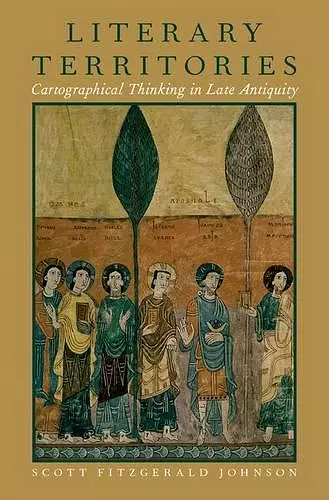Literary Territories
Cartographical Thinking in Late Antiquity
Scott Fitzgerald Johnson author
Format:Hardback
Publisher:Oxford University Press Inc
Published:28th Jan '16
Currently unavailable, and unfortunately no date known when it will be back

Literary Territories introduces readers to a wide range of literature from 200-900 CE in which geography is a defining principle of literary art. From accounts of Holy Land pilgrimage, to Roman mapmaking, to the systematization of Ptolemy's scientific works, Literary Territories argues that forms of literature that were conceived and produced in very different environments and for different purposes in Late Antiquity nevertheless shared an aesthetic sensibility which treated the classical "inhabited world," the oikoumene, as a literary metaphor for the collection and organization of knowledge. This type of "cartographical thinking" stresses the world of knowledge that is encapsulated in the literary archive. The archival aesthetic coincided with an explosion of late antique travel and Christian pilgrimage which in itself suggests important unifying themes between visual and textual conceptions of space. Indeed, by the end of Late Antiquity the geographical mode appears in nearly every type of writing in multiple Christian languages (Greek, Latin, Syriac, Armenian, and others). The diffusion of cartographical thinking throughout the real-world oikoumene, now the Christian Roman Empire, was a fundamental intellectual trajectory of Late Antiquity.
Readers will appreciate J.'s sound scholarship, attention to detail, and not least, clarity. Each chapter is helpfully concluded with a summary of the key points, so that the reader is effectively prepared to press on to the next stage of this compelling journey. What makes Literary Territories truly distinctive, however, is the combination of multi-lingual sources and the pairing of well-known case studies (e.g. the Bordeaux pilgrim and Egeria's accounts) with less well-known ones (such as The Miracles of Saint Thekla and the Syrian accounts of Thomas of Marga and Isho'dnah of Basra). Critical and illuminating, at times even revisionist, Literary Territories is a scholarly contribution of fundamental importance. Beyond Late Antique specialists, it will appeal to classicists, medievalists, as well as historical geographers, map historians, and anyone interested in pre-modern perceptions of space. * Byzantine and Modern Greek Studies *
In this ambitious book the excitement felt by Scott Johnson for his themes is palpable and infectious. * Richard J. A. Talbert, Sehepunkte *
In sum, Literary Territories is an important book that demonstrates handily how a "more fluid approach" to geographical literature can provide fresh insights into the astrological, astronomical, cosmographical, geographical, and topographical texts of late antiquity. It poses new questions for the study of Christianization and urbanization in Late Antiquity. Moreover, Johnson's insights into the dynamics and effects of cartographical thinking are likely to serve as springboards future research. Students of pilgrims' writings stand to benefit from the similarities Johnson detects between these works and other non-Christian travel genres ... With Johnson as navigator and fellow-traveler, the journey ahead is bound to be eye-opening. * Georgia Frank, Journal of Late Antiquity *
ISBN: 9780190221232
Dimensions: 155mm x 239mm x 18mm
Weight: 408g
216 pages